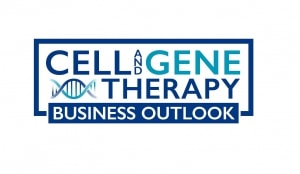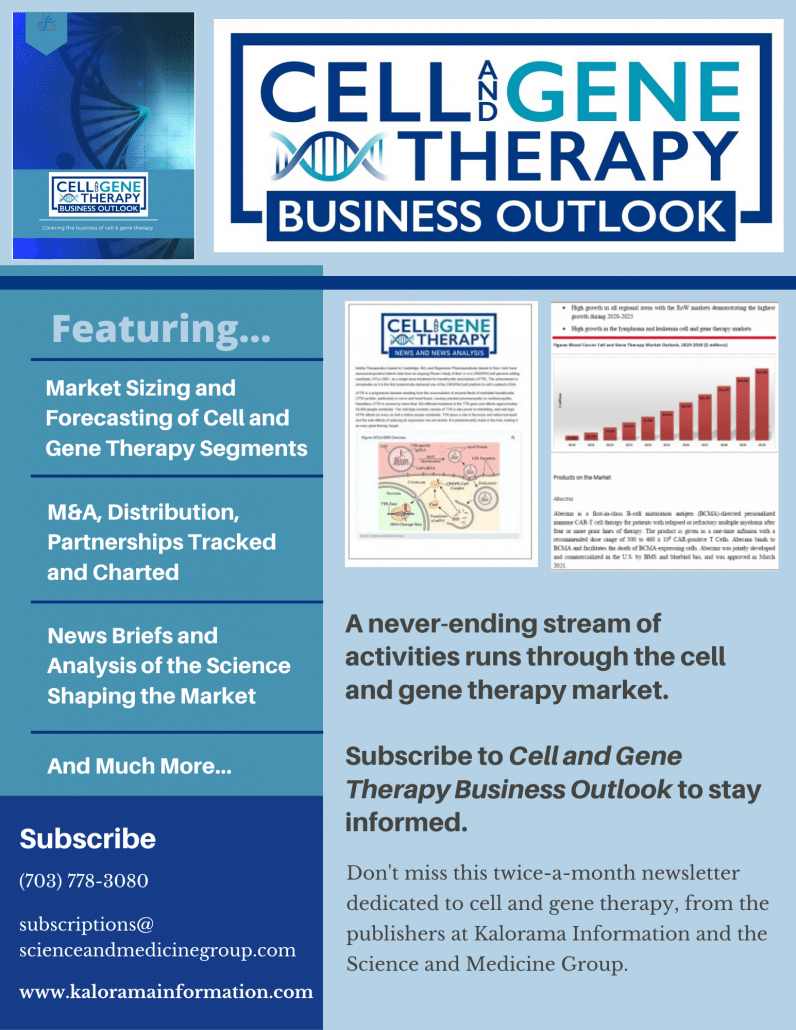
There have been a number of recent developments in cell and gene therapy, as detailed in our bimonthly newsletter, Cell and Gene Therapy Business Outlook.
- The Cell and Gene Therapy Catapult (CGT Catapult) and the UK Dementia Research Institute (UK DRI) have announced a collaboration to develop adeno-associated virus (AAV)-based gene therapies for the treatment of The two organizations will work with UK academic centers to identify and assess new AAV-based gene therapies with the best potential to address unmet medical need in dementia, then create detailed development plans to advance these projects towards the clinic, and potentially initiating early research.
- Invectys, an immunotherapy company based in Paris, France, the University of Texas MD Anderson Cancer Center, and the Cell Therapy Manufacturing Center (CTMC, a joint venture between MD Anderson and National Resilience), have announced a collaboration to jointly develop chimeric antigen receptor (CAR) T cell therapy targeting human leukocyte antigen (HLA)-G for the treatment of solid tumors. HLA-G is an immune modulator normally active during pregnancy to protect the fetus from the mother’s immune system. The molecule is also associated with tumor escape in many cancers, where its aberrant expression shields tumor cells from a patient’s innate immune responses. The collaboration will advance novel CAR-T cell therapies based upon Invectys’ HLA-G platform through preclinical development with CTMC into early-phase clinical studies at MD Anderson, uniting Invectys’ technology with the CTMC’s cell therapy development and manufacturing expertise and MD Anderson’s clinical trials experience.
- Aptamer Group, based in York, UK, has announced an agreement with Flip Gene Therapeutics, based in Cambridge, MA, to use its Optimer technology to support Flip Gene’s inducible gene therapy platform. Aptamer’s Optimer binders are affinity ligands built from oligonucleotides, and under the agreement Aptamer will develop Optimer binders to several small molecule targets which will be incorporated into Flip Gene’s inducible gene therapy platform to create responsive gene expression which can be controlled with small molecule drugs. Under the agreement, Aptamer will receive upfront payments for Optimer development, with the potential for further licensing, development, and commercial milestone payments for successful programs.
- WuXi Advanced Therapies, a contract testing, development, and manufacturing organization (CTDMO) based in Philadelphia, and Wugen, a clinical-stage biotechnology company based in St. Louis, MO, and San Diego, CA, have announced a partnership to produce Wugen’s natural killer (NK) immunotherapy WU-NK-101, currently in development to treat acute myelogenous leukemia (AML) and solid tumors. Under the agreement, WuXi will provide manufacturing and testing services for WU-NK-101, utilyzing its Good Manufacturing Process (GMP) cell therapy manufacturing and testing capabilities to support regulatory filings and clinical trials. WU-NK-101 is an allogeneic, commercially scalable, off-the-shelf cell therapy for cancer based on memory NK cells, which are long-lasting immune cells that demonstrate enhanced anti-tumor response and a cytokine-induced memory-like (CIML) phenotype.
- Affini-T Therapeutics, a T cell therapy company based in Boston, MA, and Metagenomi, a gene editing company based in Emeryville, CA, have announced a partnership to use Metagenomi’s proprietary gene editing systems to build Affini-T’s next generation ex vivo T cell receptor (TCR) cell therapies for the treatment of solid tumor Metagenomi specializes in discovering and optimizing novel base editors using an AI-based computational approach, and under the partnership agreement Affini-T will have the option to exclusively license Metagenomi’s gene editing technology to produce autologous TCR T cell therapies for specific tumor targets, with an option to expand non-exclusively into allogeneic therapies. In exchange, Metagenomi will receive tiered payments for each optioned target, plus additional milestone and royalty payments. Affini-T’s T cell therapy platform engineers both CD8+ cytotoxic and CD4+ helper T cells with a high-affinity TCR and a CD8 co-receptor to generate a coordinated CD4/CD8 response against tumor cells. The two companies will discuss additional targets to co-develop and co-commercialize in the future.
- South Korea-based mCureX Therapeutics (a subsidiary of OliX Pharmaceuticals) has announced a joint research collaboration with ToolGen, a gene editing company also based in South Korea. The two companies plan to develop gene therapies for rare hereditary eye diseases by combining mCureX’s expertise in mRNA vaccines and therapeutics with ToolGen’s CRISPR/Cas9 gene-editing technology, eventually tackling non-hereditary eye diseases as well.
- Hemostemix, based in Calgary, Canada, has announced that it has incorporated PreCerv as a wholly owned subsidiary. Hemostemix will grant PreCerv a global license to NCP-01, its autologous neuronal cell precursors, as well as its autologous stem cell technologies, to treat conditions of the central and peripheral nervous system such as neuropathic pain syndromes, CNS and peripheral nerve injuries, rare diseases, and cerebral stroke.
- The company’s autologous regenerative cell therapy platform extracts and enriches a synergetic cell population (SCP) consisting of progenitor and other supporting cells, then re-infuses them back into the patient. Hemostemix’s lead product, ACP-01, is currently being evaluated in a Phase II clinical trial for the treatment of critical limb ischemia (CLI) at sites in the Canada and United States, and the company expects the therapy to have broader applications for other ischemic disease indications including peripheral arterial disease (PAD) and cardiovascular disease.
- King of Prussia, PA-based cell and gene therapy contract development and manufacturing organization (CDMO) Center for Breakthrough Medicines (CBM), in partnership with the Discovery Labs has announced plans to accelerate construction of the largest cell therapy manufacturing operation in the world. The expansion of CBM’s cell therapy manufacturing suites and support infrastructure will be able to produce treatments for over 10,000 patients per year. The final cost is undetermined but is expected to be in the hundreds of millions of dollars. CBM plans to manufacture cell therapies across all indications, implementing rapid autologous manufacturing, high-fidelity gene-editing capabilities, and fully automated processes to meet any manufacturing demands.
- Homology Medicines, based in Bedford, MA, has announced that the U.S. FDA has lifted the clinical placed on its clinical trial evaluating HMI-102, a gene therapy for the treatment of adults with phenylketonuria (PKU). Protocol changes include a new immunosuppression regimen with the T-cell inhibitor tacrolimus and a shorter course of prophylactic steroids. HMI-102 uses the liver-tropic adeno-associated virus (AAV) vector AAVHSC15 to deliver a functional copy of the PAH gene encoding the enzyme phenylalanine hydroxylase. Homology’s other clinical programs include HMI-103, a homologous recombination-based gene editing therapy for the treatment of PKU, and HMI-203, a gene therapy for the treatment of Hunter syndrome, both of which are applying similar immunosuppression regimens.
- Charles River Laboratories, based in Wilmington, MA, and ASC Therapeutics, based in Milpitas, CA, have announced plans to further expand their manufacturing agreement. The partnership dates back to a 2019 agreement between ASC and Vigene Biosciences, which was acquired by Charles River in 2021. The new agreement concerns the manufacture of ASC618, ASC’s gene therapy for hemophilia A. Hemophilia A is an X-linked blood clotting disorder caused by a defect in the F8 gene encoding coagulation factor VIII, and ASC618 is engineered to deliver a truncated form of the gene to liver cells. The therapy has received IND clearance from the U.S. FDA, Fast Track and Orphan Drug designations from the FDA, and Orphan Drug designation from the EMA.
- Selecta Biosciences, a clinical-stage biotech company based in Watertown, MA, has announced that Sarepta Therapeutics, based in Cambridge, MA, has extended the options under the Research License and Option Agreement to license the rights to Selecta’s immune tolerance platform, ImmTOR, for use in Duchenne Muscular Dystrophy (DMD) and certain Limb-Girdle Muscular Dystrophies (LGMD). ImmTOR is a nanoparticle-based system that delivers an immunosuppressant to immune cells alongside its antigenic payload in order to promote antigen-specific immune tolerance. Under the agreement, Selecta will receive a $2 million payment for the nine-month extension to both options, and is eligible to receive an additional $4 million near-term milestone payment. Selecta will also be eligible for additional milestone payments and royalties if Sarepta exercises its option to enter a commercial license agreement either program. Selecta has also announced that it expects to release joint topline data from two clinical trials evaluating SEL-212 for the treatment of chronic refractory gout, a program being developed through an out-licensing partnership with Swedish Orphan Biovitrum. SEL-212 uses Selecta’s ImmTOR platform to deliver Pegadricase, which is a PEGylated version of urate oxidase derived from the yeast Candida utilis, designed to treat gout by reducing levels of serum uric acid. By delivering an immunosuppressant drug called rapamycin alongside Pegadricase, ImmTOR promotes immune tolerance toward the foreign enzyme. Finally, in the fourth quarter of 2022, Selecta is planning to begin a Phase I clinical trial evaluating its wholly owned gene therapy SEL-302 for the treatment methylmalonic acidemia (MMA), a rare metabolic disease that affects the body’s ability to metabolize certain amino acids and fats. SEL-302 uses the ImmTOR platform to deliver MMA-101, an AAV8-based gene therapy that delivers a functional copy of the MMUT gene. ImmTOR delivery promotes immune tolerance toward the AAV vector, increasing its duration and allowing it to be re-dosed.
- Umoja Biopharma, an immuno-oncology company based in Seattle, WA, and TreeFrog Therapeutics, a cell therapy company based in Pessac, France, have announced a collaboration to evaluate Umoja’s induced pluripotent stem cells (iPSCs) within TreeFrog’s proprietary C-Stem technology platform. C-Stem utilizes biomimetic alginate micro-capsules to protect iPSCs from external stress and simulate in vivo growth conditions during culture, allowing the preservation of stem cell quality during mass-production and in-capsule differentiation of cells. Umoja is developing an engineered iPSC platform which uses a synthetic rapamycin-activated cytokine receptor (RACR) to drive cell differentiation to innate cytotoxic lymphoid cells such as natural killer (NK) cells, without using exogenous cytokines or feeder cells.
- REGENXBIO has announced the opening of its Manufacturing Innovation Center, a $65 million good manufacturing practice (GMP) gene therapy manufacturing facility located at the company’s 132,000-square-foot headquarters in Rockville, MD. The new facility will implement REGENXBIO’s NAVXpress platform suspension cell culture process, enabling the company to manufacture its proprietary NAV Technology-based adeno-associated virus (AAV) vectors at scales up to 2,000 liters, making it of the few companies in the world capable of production at that scale. REGENXBIO’s NAV Technology platform retains exclusive rights to more than 100 novel AAV vectors, including AAV7, AAV8, AAV9 and AAVrh10, which are being used in the development of a broad pipeline of candidates by the company and its licensees. The company currently has programs in wet age-related macular degeneration (AMD), Duchenne muscular dystrophy (DMD), mucopolysaccharidosis types I and II (MPS I and MPS II), and CLN2 disease. As of 2021, REGENXBIO had invested more than $100 million into expanding its Rockville headquarters, and the company has hired 200 people in the past two years. Last October, the company joined the Bespoke Gene Therapy Consortium (BGTC), which was launched as part of the Accelerating Medicines Partnership (AMP) program managed through the Foundation for the National Institutes of Health (FNIH). The public–private partnership includes the Food and Drug Administration (FDA), the National Institutes of Health (NIH), and multiple pharmaceutical companies, biotech companies, and non-profits.


